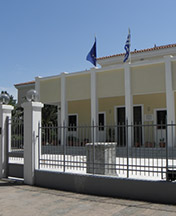An ancient myth connects Lesbos with the famous lyre player and singer Orpheus, who is said to have been killed by evil deities in Thrace, who dismembered him and threw his pieces at Evros, with his head and lyre ending up in Lesbos. The history of Lesbos, however, begins in 1507 BC when it was colonized by the Pelasgians, then by the Achaeans in 1393 BC and by the Aeolians in 1100 BC. During the 7th century BC, the island became a center of artistic and philosophical achievements and great naval power. In the 6th century BC, Lesbos was conquered by the Persians. In 479 BC it was occupied by the Athenians and became a member of the Delian Alliance. In 334 BC it became part of the Macedonian Empire and, after the death of Alexander the Great, it fell under the rule of the Ptolemies. In 88 BC, the Romans occupied Lesbos and made it part of the Roman Empire. After the fall of the Empire, Saracens and Latins conquered successively the island which eventually became part of Byzantium in 1261. In 1354, Lesbos came under the rule of the Genoese, which lasted until 1460, when they were replaced by the Ottomans. The signs of Turkish rule remain alive until today in Lesbos, as there are many mosques there. In 1824, the islanders rebelled against their oppressors but the revolution drowned in blood. On November 8, 1912, Lesbos was liberated by Admiral Kountouriotis and his fleet. The Treaty of Lausanne, signed in 1923, declared the union of the island with the rest of Greece. Another important event in the history of Lesbos was the year 1922 when refugees from Asia Minor came to the island and gave a new economic and cultural flourishing to the local community. Lesbos was last conquered by the Germans during the Second World War and was liberated on September 10, 1944.













